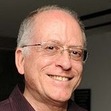Ellis Shuman's Blog, page 26
May 19, 2019
"The novel moves at a rollicking pace"
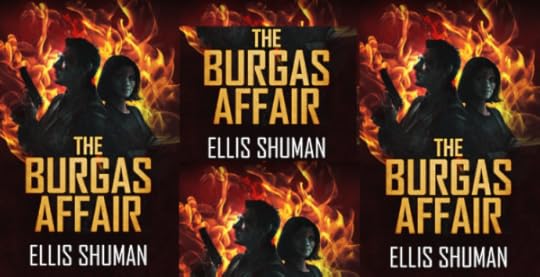
Based on the aftermath of the 2012 coach bombing at Burgas in Bulgaria, Ellis Shuman’s fictional thriller, The Burgas Affair (Createspace, 2018), takes us on a roller coaster ride through Bulgaria and the Black Sea coast, following the exploits of a joint Bulgarian/Israeli detective team in tracking down the perpetrators. As such, this is perfect beach reading if you are staying on the Black Sea coast this summer.
Read the full review on talkingthepiste.com
Published on May 19, 2019 21:32
May 14, 2019
It’s Not Easy Writing a Bad Review of a Good Book
 I was already reading
The Overstory by Richard Powers
(W. W. Norton & Company, April 2018) when it was announced that the novel had won the 2019 Pulitzer Prize for Fiction. I was reading the book but I wasn’t enjoying it. But, seeing that it had just won a literary award, I was determined to read until the end and see if I could understand why it had won the prize.
I was already reading
The Overstory by Richard Powers
(W. W. Norton & Company, April 2018) when it was announced that the novel had won the 2019 Pulitzer Prize for Fiction. I was reading the book but I wasn’t enjoying it. But, seeing that it had just won a literary award, I was determined to read until the end and see if I could understand why it had won the prize.After finishing the book, I wasn’t sure whether I would write a review of The Overstory. I hesitated, not wanting to write a bad review because as an author, I know what it’s like to be on the receiving end of criticism, if it’s not constructive. But the whole point of book reviews is to help a reader decide whether to read a book or not. To let a reader know what they are getting into. So as a service to readers, I will list a few of my impressions of this Pulitzer-winning novel.
Speaking of words, the author has a very rich vocabulary. He knows a lot of about trees and he knows a lot of words about trees. Too many. Even if you are a crossword puzzle fanatic or a professional Scrabble player, you will still struggle reading words like these:
* coprophagic
* mycorrhizal
* involucres
* krummolz
It is possible to skim over the words you don’t understand but the vocabulary was not my main problem with the book. There are nine main characters in the story and I found that I couldn’t connect to many of them. All of their lives revolved around trees, and the need to save the environment, but not all of them were essential to the plot. In hindsight, I can’t even remember most of them. Disturbingly, in one chapter the characters’ names changed from one paragraph to the next.
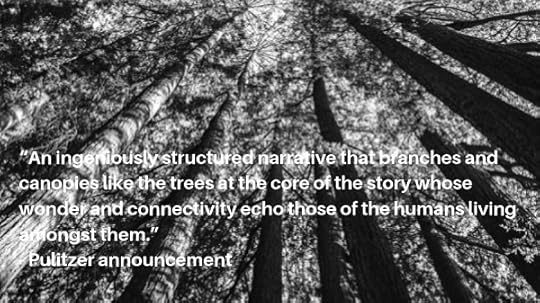
Interesting things take place in the book that will certainly stick in one’s mind, but other story lines seem placed there for no reason.
The author tells us, over and over, that trees play an important role in our lives, one that is easily overlooked. Trees live, breath, communicate, and even move, and we barely see any of this. If the author’s argument is that by saving the trees we can save ourselves, it is an important one. But the author could have conveyed this message in a much shorter novel, with fewer characters, and with a less scholarly vocabulary.
I believe The Overstory is seriously overrated. It’s a good book, a well-written one, but I can’t determine exactly why it won the Pulitzer.
Richard Powers is an American author who has published twelve novels that explore the effects of modern science and technology. His novel The Echo Maker won the 2006 National Book Award for Fiction. He and has taught at the University of Illinois and Stanford Universities. He won the 2019 Pulitzer Prize for Fiction for The Overstory.
Original tree image by Casey Horner on Unsplash.
Published on May 14, 2019 23:00
April 27, 2019
The “Pogacha”

We are celebrating the birth of Nikola, the son of one of my wife’s colleagues. We are in the Sofia apartment where the newborn has been kept at home with his mother for 40 days, a period in which only the immediate family has been allowed to visit. But now the baby is no longer at risk from evil spirits. And a special round loaf bread has been baked for the occasion. The pogacha.
During our two-year stay in Bulgaria, we witnessed many of the local customs but this was the first time we had been invited into a Bulgarian home to be part of such an intimate ceremony. Usually, only women - family members and friends - are invited to this special ceremony. Traditionally men are supposed to leave the home, but on this occasion, I am invited to stay and along with a few other men, wait in a separate room.

Although the customs surrounding the birth of a baby in Bulgaria had their origins many centuries ago, and most of them have not survived, there are some traditions which made their way to modern times. Many of these are customs still followed by women after giving birth. Traditionally, during the 40-day period the mother is considered “unclean” and as a result, she and her baby are at great risk from the evil spirits. Today, however, it is more of a feeling of protecting the baby from germs and keeping him safe.
In the main room of her colleague’s home, my wife witnesses first-hand the role of the pogacha in the celebration. The pogacha was baked by a woman relative or friend – the only condition being that both her parents are alive. After drinking wine or whiskey, and wishing each other “Nazdrave” – to health – the pogacha is covered with a cloth. The women then place money, bills or coins, onto the cloth, and the corners of the cloth are gathered and tied in a tight knot. This is to ensure that the baby will not grow up to be a spendthrift. The knotted cloth is then placed out of reach on the top of a cabinet.
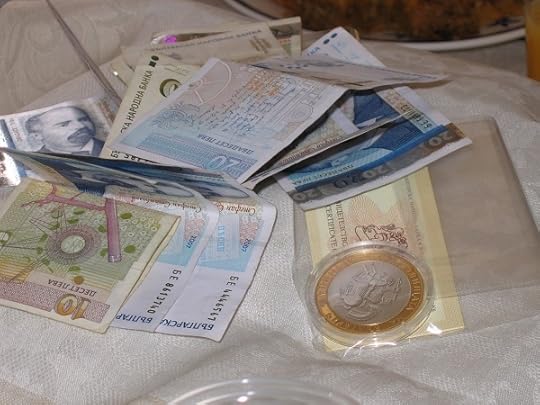
At this point, the mother is led to a chair while holding Nikola. Two women lift the pogacha over the mother’s head and a clean cloth is held to catch the crumbs. Again, the parents of these women must be alive for them to be part of this ceremony. The bread is then broken over the mother’s head and pieces are distributed to the guests. Each guest offers a blessing to the baby upon receiving their share of the bread.
The pogacha is very tasty as are the other refreshments. Meats, cheeses, and pastries. The sweet banitsa pastry with pumpkin and walnuts, made by the 87-year-old great-grandmother of little Nikola, is particularly scrumptious. Nikola is her fifth great-grandchild.
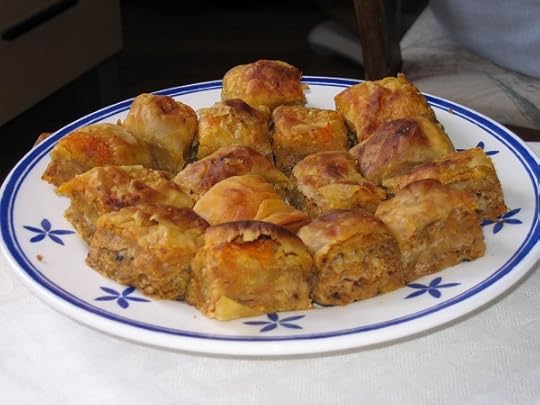
In the next room, I am also enjoying the refreshments, which include beer and rakia as well. After much merriment, we wish the proud parents and young Nikola health and happiness. Nazdrave!
Published on April 27, 2019 09:44
April 14, 2019
Recent Reads - April 2019 edition

This year, winter in Israel was a long, drawn-out affair. After five years of drought, abundant rains fell, turning the hillsides and fields brilliant shades of green. Luckily, there are always good books to keep you company during the winter months. Listed below are some of the books I’ve read recently. I hope you will enjoy them as well!
The Immortalists by Chloe Benjamin (G.P. Putnam's Sons, January 2018). How would you live your life if you knew the date of your death? This is the secret revealed in 1969 to the four young siblings of the Gold family. Simon is the youngest and he is the first to leave the family’s New York City home for the gay life of San Francisco. His departure is followed by Klara, who elects to become a Las Vegas magician. Daniel starts a career as a doctor in the American army and eldest sister Varya throws herself into the study of primates and research into longevity among human. Each of these stories is told in turn and we follow the siblings and their unfulfilled lives as they approach the date of their predetermined deaths. Well-developed characters and highly recommended!
Beartown by Fredrik Backman (Penguin, May 2018). You don’t have to be a hockey fan to enjoy this novel set in a small Swedish town. Games on the ice serve as a colorful background to captivating human drama. The future of the town is linked to a team of junior hockey players and the families who support them. And then, the town is torn apart by an act of violence - the star player is accused of raping the general manager's daughter. The novel is told in a highly readable, conversational style and is followed by a sequel, Us Against You (Atria Books, June 2018. These novels were written by the author of A Man Called Ove – all of them truly enjoyable!
My Sister's Grave by Robert Dugoni (Thomas & Mercer, November 2014). I saw an advertisement for this novel in a BookBub newsletter. I was intrigued by the claim that the Tracy Crosswhite series "has garnered millions of readers across the globe." Reading the first in a series is the best way to be introduced to both the main characters and the author’s skills at keeping the reader glued to the page. Tracy Crosswhite is a big city homicide detective who has spent her entire adult life obsessed with the the disappearance and murder of her sister. Tracy doesn't believe that the man convicted of the crime is guilty, especially since the body was never found. Returning to her hometown in northern Washington State, Tracy searches for the real killer and unearths secrets from the past along the way. Readable, but not readable enough to lead me to the next book in the series.
Lone Wolf in Jerusalem by Ehud Diskin (Greenleaf Book Group Press, August 2018). This novel is set in the post-World War Two period, when the British military occupation is preventing the establishment of a Jewish homeland. David Gabinsky survived the horrors of the war by being active in the resistance. In Palestine the main thing on his mind is vengeance, not against the Nazis but against the British. David sets off on one mission after another, not working with the Irgun, Lehi, or Haganah, but rather as a lone wolf gunman. The characters in this novel come to life as does the historic period just before Israel was born. The book was originally written in Hebrew and is advertised as having been a bestseller in Israel. Lone Wolf could easily have served as the first of a series. An entertaining read!
Happy reading!
Published on April 14, 2019 22:29
April 7, 2019
Why I am voting Meretz, again

The main reason my vote went to Meretz in the past was its stance on the conflict with the Palestinians. Amazingly, that issue is barely mentioned in the run-up to the elections this year.
Looking through an archive on my blog I found an old article I wrote explaining why I was voting for the left-wing social-democratic and green political party. Although I agree with everything I wrote back then, the arguments I made seem so out of touch with today’s reality. And the reality right now is pretty bleak.
The outcome of the vote, I’m afraid, is already known. Bibi Netanyahu and his Likud party will again form a coalition with the rightwing parties. The next government will be extremist, a threat to our democratic state. Expect additional actions against Israel’s Arab minority; further concessions to the ultra-Orthodox; attacks on the justice system; and the annexation of Palestinian territories.
Meretz’s platform starts with the words, “The State of Israel is a democratic country, the country of the Jewish people and all its citizens.” Meretz works tirelessly to protect civil rights and promote social justice, including the rights of women, LGBTQ, retirees, national minorities, and people with limitations. These are worthy causes and I fully support them.
Meretz calls for an end of Israel’s rule over the Palestinians and the end of the occupation of Palestinian territories. Furthermore, Meretz calls for the partition of the country: two nations for two peoples. Annexation of the territories, in my opinion, will lead to an end of Israel as a Jewish, democratic state.
I have only touched briefly on what Meretz’s platform includes. These are not just slogans. Meretz has actively and relentlessly pursed its social democratic agenda in the Knesset year after year.
Whatever the outcome of the elections, Israel is in for a rough ride ahead. My vote may not influence which party will form the government, but at least it will help promote the social, democratic, and political causes in which I believe. My vote is going to Meretz.
Originally posted on The Times of Israel.
Photo credit: Meretz website
Published on April 07, 2019 11:30
March 25, 2019
Late Night Encounter with My New Neighbors
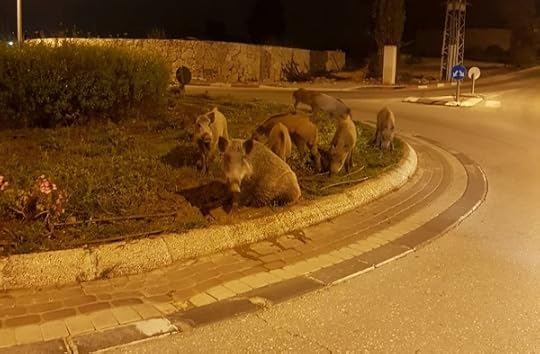
I stared into the thick bushes and I could hear them. Shifting their weight, pawing the earth. Grunting. I couldn’t see them in the dark, or smell them, but I could sense their presence. There were two of them and they were large, and hairy, and very wild. And they knew I was nearby.
I had heard that a family of wild boars had made its home in the wilderness near my home on Moshav Neve Ilan. A shadow-filled photo depicted a late-night gathering of adults and piglets stomping around a traffic circle, sniffing at the earth. There were traces of them in my own garden – clumps of upturned dirt and hoofprints. But, for some strange reason, I never believed that they were real.
But then we began to hear the mournful howls of jackals late at night. Jackals howling in unison, or not in unison, from somewhere in the valley, crying out to each other, causing the dogs on the moshav to bark hysterically in defense of our homes. I had seen jackals from afar when driving out of the moshav in the early morning hours, but I had never seen one up close.
One night when I was babysitting my granddaughters, a jackal showed up at the back door just two meters away from me. It stared through the glass into the living room. It was larger than a fox, thinner than a dog, and it was panting heavily. If the door had been open, it might have dashed into the house. Before I fully registered what I was seeing, the jackal was gone.
And then I met the boars. Last week, Jodie and I returned home just before midnight after attending a screening of “Joni 75” – a musical tribute to Joni Mitchell. We parked the car and began to cross the street. Suddenly, they ran across our path. Two huge, hairy, grunting boars, dashing from the greenery near our house to the bushes on the other side of the street.
I pulled out my phone and approached their lair under the shrubbery. I could clearly sense their presence. I heard their panting. Their grunts.
“Don’t get too close!” Jodie warned me.
I stepped back, although it wasn’t out of fear that the boars would charge, targeting me with their tusks. I stepped back because I realized they would probably run away too quickly for me to snap their picture.
Days later, I am still shaken up from my close boar encounter. I wonder when I will next meet my new neighbors.
Photo: Taken by a moshav resident and shared on social media.
Published on March 25, 2019 23:27
March 18, 2019
Jerusalem Is Much Harder to Run than Tel Aviv

My thigh muscles ache as I run up the cobblestoned ramp-like street leading to Jaffa Gate. I pass through the historic walls, breached for the visit of German Kaiser Wilhelm II in 1898. I speed past the Citadel and down the narrow alleyways of the Armenian Quarter on my way to Zion Gate. I am running in the Old City of Jerusalem! I am running the Jerusalem Marathon’s 10-kilometer race and it isn’t easy!
I had challenged myself just three weeks before to run ten kilometers in the Tel Aviv Marathon. That was the first time I had ever run the distance in a real race. I have run 10 kilometers on a treadmill and on occasion I have made early morning 10-kilometer runs from my home in Moshav Neve Ilan to the entrance of the Arab village of Abu Gosh and back, but Tel Aviv was the first time I had ever competed with others.
‘Competed’ is not really the appropriate word as my main goal was to complete the distance. That said, I finished the Tel Aviv course in a respectable time – 62 minutes. Jerusalem, I knew, would be much harder. Jerusalem is hilly. Jerusalem is colder. Did I mention that Jerusalem is hilly? My goal, again, is to make it to the finish line.
It had rained the day before and heavy downpours were predicted for the following day, but Friday morning dawns just partially cloudy. And cold. I join some 40,000 other runners participating in the various races. There are marathoners from overseas and families running together in a one-kilometer fun race. I take my place for the third start of the 10-kilometers. And then the race begins.
The early stretches are slow going as everyone is bunched together. It is exciting to see others running for charitable causes, to see fathers racing while pushing baby strollers, to see people accompanying blind runners. This is not a competition, I realize, but simply a very fun thing to do. Fun, but challenging. I am enjoying myself.
And then Bezalel Street, the first uphill part of the run. People slow down. People start walking. I keep on running, putting one foot in front of the other as I make my way up the street, but I need to steer clear of the walkers. Avoiding these human obstacles isn’t easy as my muscles take the incline.

Things get easier as we turn onto King George and then race down Jaffa Road. Here the street is wide, marked in the middle by the tracks of the light rail train. We are cheered onwards by people on the sidewalks. Elderly pedestrians carrying shopping bags and ultra-Orthodox yeshiva students ignore us. A few brave citizens dart across the street between the runners. A band plays uplifting music in Zion Square. Teenagers hand out bottles of mineral water and then, before we know it, we face the Old City walls.
Running through the Old City is the most memorable part of the run, but also the slowest. Participants walking the course nearly block the narrow alleyways of the Armenian Quarter and it is hard to pass by them and keep up my pace. A sharp turn at Zion Gate and we are again outside the walls, cheered on by a group of Japanese tourists. Around historic Mt. Zion and down into the valley. And then another steep ascent.
My legs ache but my breathing is regular. I can do this, I tell myself. I keep running, pushing ahead with a renewed burst of energy. I pass the Jerusalem Cinematheque and then I reach the top.
At the First Station, Jerusalem’s original train station, I spot runners going in the opposite direction. These are participants in the half marathon, a distance far beyond the capabilities of my body. Ten kilometers I can do. Just a few more kilometers more and I will complete the course.

Jabotinsky Street – another steep climb. My muscles cry out, almost begging me to stop, or at least slow down. But I keep going. At the crest of the hill, we turn down a narrow side street and then begin the descent on Derech Aza in Jerusalem’s Rehavia neighborhood.
As I make my way downhill, I near a group of older men running together as a bunch. I can pass them easily, I see, but then I notice they are accompanying someone I recognize.
Nir Barkat! The former mayor of Jerusalem and now a candidate on the Likud’s list for the Knesset in the upcoming elections. I shake his hand and he wishes me luck. I pass by him on his right (although it would have been more fitting, from an ideological perspective, if I had passed by him on his left), and keep speeding downhill.
Ben Tzvi Boulevard and the final stretch. We are going uphill again? As we’re almost at the end of the race, I try to pick up my pace but it’s impossible because other runners are in the way. And then the finish line is in sight. I cross the line, slow to a stop. My unofficial time is 66 minutes. That’s 4 minutes slower than my run three weeks before, but then, Jerusalem is much harder to run than Tel Aviv. I catch my breath and smile. I did it!

Published on March 18, 2019 23:33
March 6, 2019
Review of 'The Art of Leaving' by Ayelet Tsabari
 In the opening pages of her memoir, Ayelet Tsabari’s father promises that he will one day publish her book. Ayelet, ten-years-old at the time, “had been writing ever since [she] learned the alphabet.” Even at that young age, the author’s love for writing was developing into a passion that would nourish and sustain her on peripatetic travels around the world. It is during these travels that the author seeks to answer the question that never fails to accompany her - where is home?
In the opening pages of her memoir, Ayelet Tsabari’s father promises that he will one day publish her book. Ayelet, ten-years-old at the time, “had been writing ever since [she] learned the alphabet.” Even at that young age, the author’s love for writing was developing into a passion that would nourish and sustain her on peripatetic travels around the world. It is during these travels that the author seeks to answer the question that never fails to accompany her - where is home?In The Art of Leaving by Ayelet Tsabari (Random House, February 2019) we witness the transformation of the author’s childhood growing up in a large Yemeni family in a Tel Aviv suburb into a collection of prize-winning short stories. Also serving as background are her unruly service in the Israeli Defense Forces; her extended sojourns on the beaches of India and Thailand; her first marriage; and the awakening, later, of maternal instincts in Canada.
Yet, home is also her family in Israel. The house her father built with his own hands and the Yemeni traditions of her mother and grandmother anchor Ayelet’s life, drawing her back again and again to Israel. After searching “for a suitable definition for home,” she admits to her brother, “I have many homes.”
Ayelet begins to question whether she should continue her extensive traveling and maintain the nomadic lifestyle she so willingly chose.
“It was safer to keep going than to stand still. ... Sometimes I wondered what my life would have been like if I had chosen to stay, if I had pursued the journalism career I once had, if I had lived close to my family. If I hadn’t been so terrified of staying in one place.”
Sadly, Ayelet’s father passed away before he could see his daughter’s work in print. He would not live to see Ayelet’s award-winning debut collection of short stories, The Best Place on Earth , and he would not see the publication of her equally prize-worthy memoir.
“Home is collecting stories, writing them down, and retelling them,” the author tells us. “Home is writing, and it grounds, sustains, and nourishes me. Home is the page. The one place I always, always come back to.”
Ayelet’s memoir, with her eloquent and captivating command of both language and narrative, stays in our minds long after we’ve read the last page. The book leaves us eager to share the next stages of Ayelet Tsabari’s literary travels.
Ayelet Tsabari ’s debut collection of short stories, The Best Place on Earth, won the Sami Rohr Prize for Jewish Literature and the Edward Lewis Wallant Award and was long listed to the Frank O’Connor International Short Story Award. Excerpts from The Art of Leaving have won a National Magazine Award and a Western Magazine Award in Canada, and The New Quarterly ‘s Edna Staebler award. Ayelet teaches at the University of King’s College’s MFA in Creative Nonfiction, at Tel Aviv University, and at the University of Toronto’s School of Continuing Studies.
Buy The Art of Leaving and read it now!
Originally published at The Times of Israel.
See also:
Book review of 'The Best Place on Earth' by Ayelet Tsabari
Stories from the Heart of Israel
Published on March 06, 2019 21:48
February 26, 2019
Tel Aviv Marathon Man: I Run the 10 Kilometer Race
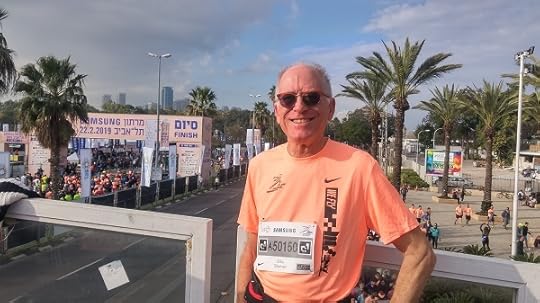
When I started exercising in earnest four years ago, I never imagined that one day I would be running the 10 Kilometer race in the Tel Aviv Marathon. In fact, back then I could barely walk 5 kilometers on a treadmill. A ten-kilometer race? It was unimaginable at the time and I can’t believe it now.
Last week I shocked my family and friends, and more importantly myself, when I finished the race’s course in a very respectable 62 minutes. I placed 99th in my age category (out of 252 runners) and in 6,346th place out of 14,227 runners of all ages in total. I have run faster 10-kilometers on a treadmill but this was the first time I had ever participated in a race of any kind.
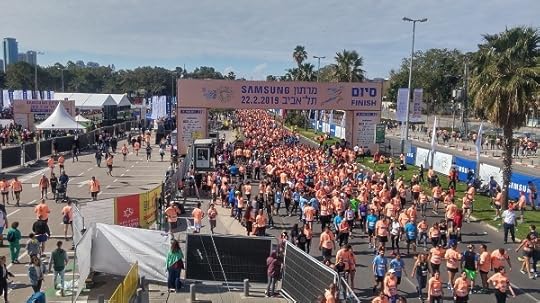
The race started on Rokach Blvd., at the congress center where the Eurovision song contest will take place in May. We ran down Dizengoff Street and then back up Ibn Gvirol. A final dash along Rokach and the run was complete. Last year I ran the 5-kilometer race in the Jerusalem Marathon. Running in Tel Aviv is easy compared to the hills of Jerusalem.
I can’t help but think I’m crazy. Running this sort of distance, following only four years of exercise and with minimal running experience, is not good for someone my age. Today, nearly a week later, my body still aches and my muscles are sore. I don’t know when I’ll next be capable of running ten kilometers.

Still, running the Tel Aviv Marathon is an accomplishment I’ll always be proud of. I challenged myself to participate and I came through in flying colors. I put mind over matter as I ran, telling myself repeatedly “I can do it.” And I did.
What’s the next challenge? Let my body fully recover and then I’ll make my plans.
Published on February 26, 2019 22:28
February 17, 2019
My Modern World: Podcasts
Reflections on the 21st century, and how it took me so long to get here.
 Photo by NeONBRAND on Unsplash
Photo by NeONBRAND on Unsplash
Podcasts have been around since 2003 but I only discovered them last year. Podcasts, if you’re not familiar with them, are primarily an episodic series of audio shows that can be downloaded for listening. Until last year I didn’t realize that I had lot of spare time for listening. Now I listen to podcasts every morning as I drive to the train station and every evening as I drive home.
Yesterday, for example, I listened to podcasts about coral reefs, noise pollution, and how diseases could be detected at a very early stage with breath analysis. In recent weeks I have listened to podcasts explaining gravity, suggesting theories where the moon came from, and exposing the dangers of artificial intelligence. In other words, I have expanded my scientific knowledge.
But I also listen to podcasts purely for amusement. Like this morning’s podcast questioning whether the Loch Ness Monster is real. Or a podcast on the history of Ping Pong. And one asking the very important question - who invented lemonade?
According to Fast Company, “2018 was the year podcasts went mainstream.” One of the podcasts that is credited for the rise of their popularity is “ Serial ”. Hosted by Sarah Koenig, the award-winning series reported on the investigation into the murder of a high school student in 1999 and included interviews with the student’s ex-boyfriend who was convicted of the crime, but may be innocent. I found the series extremely well produced and I binged on the twelve episodes over the course of twelve days.
As a result of that experience, I tried out a number of other true crime series. I listened to “ In the Dark ” (an investigation into the 1989 abduction of Jacob Wetterling in rural Minnesota); and “ Bear Brook ” (an investigation into unsolved murders in New Hampshire's Bear Brook State Park back in 1985).
Sometimes I listen to history podcasts. I listened to all 12 hour-long episodes of “ Unobscured ”, a series which “takes listeners on a deep dive into the dark and misunderstood events of the Salem witch trials in 1692.” And from time to time I listen to “ The Bulgarian History Podcast ”, a podcast on medieval Bulgarian history, a history that I am partially familiar with from the two years I lived in Sofia.
The best thing about podcasts is that there is something for everyone. I have listened to a wide variety to determine which ones keep my interest. I tried out the New York Times’ “ The Daily ” podcast but found that I don’t care much about American politics. On occasion I listen to “ Armchair Expert with Dax Shepard ” and “Conan O’Brien Needs a Friend” for comic relief. And, in order to further expand my knowledge of science, I tune into episodes of “ Daniel and Jorge Explain the Universe ”.
Stuff You Should Know
Possibly my favorite podcast of all, and one that is thoroughly enjoyed by my wife as well, is “ Stuff You Should Know .” The series, co-hosted by Josh Clark and Charles (Chuck) Bryant, has broadcasted more than 1200 episodes on a wide range of topics. The series explains in layman’s terms the Munchausen Syndrome; fossils; Dr. Seuss; the Navajo Code; safety pins; and, as mentioned before, the history of lemonade. Essential information!
In order to listen to podcasts I first had to master the Bluetooth installed in my car. Once I figured that out, I needed to find the best app for listening to podcasts on my phone. I tried out Spotify but the selection of podcasts there is a bit limited. Now I use, and highly recommend, Castbox . Castbox is the “best free podcast app with over 95 million volumes of content.”
Currently I am listening to “ The End of the World ” podcast, Josh Clark’s “deep dive ... into the world of existential risks.” The series raises the question of whether our species will survive the next 100 years. That question is never fully answered in the series but one thing is certain. We will never run out of podcasts to listen to.
 Photo by NeONBRAND on Unsplash
Photo by NeONBRAND on UnsplashPodcasts have been around since 2003 but I only discovered them last year. Podcasts, if you’re not familiar with them, are primarily an episodic series of audio shows that can be downloaded for listening. Until last year I didn’t realize that I had lot of spare time for listening. Now I listen to podcasts every morning as I drive to the train station and every evening as I drive home.
Yesterday, for example, I listened to podcasts about coral reefs, noise pollution, and how diseases could be detected at a very early stage with breath analysis. In recent weeks I have listened to podcasts explaining gravity, suggesting theories where the moon came from, and exposing the dangers of artificial intelligence. In other words, I have expanded my scientific knowledge.
But I also listen to podcasts purely for amusement. Like this morning’s podcast questioning whether the Loch Ness Monster is real. Or a podcast on the history of Ping Pong. And one asking the very important question - who invented lemonade?
According to Fast Company, “2018 was the year podcasts went mainstream.” One of the podcasts that is credited for the rise of their popularity is “ Serial ”. Hosted by Sarah Koenig, the award-winning series reported on the investigation into the murder of a high school student in 1999 and included interviews with the student’s ex-boyfriend who was convicted of the crime, but may be innocent. I found the series extremely well produced and I binged on the twelve episodes over the course of twelve days.
As a result of that experience, I tried out a number of other true crime series. I listened to “ In the Dark ” (an investigation into the 1989 abduction of Jacob Wetterling in rural Minnesota); and “ Bear Brook ” (an investigation into unsolved murders in New Hampshire's Bear Brook State Park back in 1985).
Sometimes I listen to history podcasts. I listened to all 12 hour-long episodes of “ Unobscured ”, a series which “takes listeners on a deep dive into the dark and misunderstood events of the Salem witch trials in 1692.” And from time to time I listen to “ The Bulgarian History Podcast ”, a podcast on medieval Bulgarian history, a history that I am partially familiar with from the two years I lived in Sofia.
The best thing about podcasts is that there is something for everyone. I have listened to a wide variety to determine which ones keep my interest. I tried out the New York Times’ “ The Daily ” podcast but found that I don’t care much about American politics. On occasion I listen to “ Armchair Expert with Dax Shepard ” and “Conan O’Brien Needs a Friend” for comic relief. And, in order to further expand my knowledge of science, I tune into episodes of “ Daniel and Jorge Explain the Universe ”.
Stuff You Should Know
Possibly my favorite podcast of all, and one that is thoroughly enjoyed by my wife as well, is “ Stuff You Should Know .” The series, co-hosted by Josh Clark and Charles (Chuck) Bryant, has broadcasted more than 1200 episodes on a wide range of topics. The series explains in layman’s terms the Munchausen Syndrome; fossils; Dr. Seuss; the Navajo Code; safety pins; and, as mentioned before, the history of lemonade. Essential information!
In order to listen to podcasts I first had to master the Bluetooth installed in my car. Once I figured that out, I needed to find the best app for listening to podcasts on my phone. I tried out Spotify but the selection of podcasts there is a bit limited. Now I use, and highly recommend, Castbox . Castbox is the “best free podcast app with over 95 million volumes of content.”
Currently I am listening to “ The End of the World ” podcast, Josh Clark’s “deep dive ... into the world of existential risks.” The series raises the question of whether our species will survive the next 100 years. That question is never fully answered in the series but one thing is certain. We will never run out of podcasts to listen to.
Published on February 17, 2019 22:17

